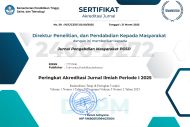Pengenalan dan Sosialisasi Game Edukasi GCompris kepada Orang Tua sebagai Bentuk Aktivitas Pembelajaran Anak
Abstract
Keywords
Full Text:
PDFReferences
Agusriani, A., & Fauziddin, M. (2021). Strategi orang tua mengatasi kejenuhan anak belajar dari rumah selama pandemi covid-19. Jurnal Obsesi: Jurnal Pendidikan Anak Usia Dini, 5(2), 1729-1740. https://doi.org/10.31004/obsesi.v5i2.961
Akman, B., & Özgül, S. G. (2015). Role of play in teaching science in the early childhood years. In K. C. Trundle & M. Saçkes (Eds), Research in Early Childhood Science Education, (pp 237-258). Illinois: Springer. https://doi.org/10.1007/978-94-017-9505-0_11
Arirahmanto, B. B., & Muis, T. (2016). Pengembangan aplikasi penurunan kejenuhan belajar berbasis android untuk siswa SMPN 3 Babat. Jurnal Mahasiswa Bimbingan Konseling 6(2), 1-5
Coudoin, B. (2014). GCompris. (GNU General Public License). GCompris. Retrieved March 25, 2021, from http://gcompris.net/index-en.htm.
Edwards, S. (2013). Digital play in the early years: A contextual response to the problem of integrating technologies and play-based pedagogies in the early childhood curriculum. European Early Childhood Education Research Journal, 21(2), 199-212. https://doi.org/10.1080/1350293X.2013.789190
Fithri, D. L., & Setiawan, D. A. (2017). Analisa dan perancangan game edukasi sebagai motivasi belajar untuk anak usia dini. Simetris: Jurnal Teknik Mesin, Elektro dan Ilmu Komputer, 8(1), 225-230. https://doi.org/10.24176/simet.v8i1.959.
Hewi, L., & Asnawati, L. (2021). Strategi pendidik anak usia dini era covid-19 dalam menumbuhkan kemampuan berfikir logis. Jurnal Obsesi: Jurnal Pendidikan Anak Usia Dini, 5(1), 158-167. https://doi.org/10.31004/obsesi.v5i1.530
Hidayat, Y. (2016). Pengaruh slow learner dan kejenuhan belajar terhadap kesulitan belajar fisika siswa MTs. Madani Alauddin Paopao Kabupaten Gowa. Jurnal Inspiratif Pendidikan, 5(2), 332-341. https://doi.org/10.24252/ip.v5i2.3487
Plowman, L. (2016) Learning technology at home and in preschool. In N. Rushby & D. W. Surry, D. (eds.), Wiley Handbook of Learning Technology, (pp. 96–112). Malden: Wiley-Blackwell.
Sari, D. P., Asrori, M., & Radiana, U. (2016). Pemanfaatan game edukasi berbasis open source bagi anak attention deficit hyperactivity disorder (ADHD). Jurnal Pendidikan dan Pembelajaran Khatulistiwa, 5(1), 1-16. http://dx.doi.org/10.26418/jppk.v5i1.13088
Warisyah, Y. (2015). Pentingnya "pendampingan dialogis" orang tua dalam penggunaan gadget pada anak usia dini. Prosiding Seminar Nasional Pendidikan 2015, (pp. 130-138). Ponorogo: FKIP Universitas Muhammadiyah Ponorogo.
DOI: https://doi.org/10.17509/jpm.v2i1.49969
Refbacks
- There are currently no refbacks.
Copyright (c) 2022 Universitas Pendidikan Indonesia

Jurnal Pengabdian Masyarakat PGSD is licensed under a Creative Commons Attribution 4.0 International License.
This journal is indexed by

.png)



1.png)

1.png)


1.png)